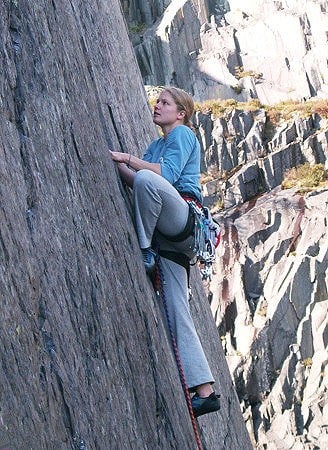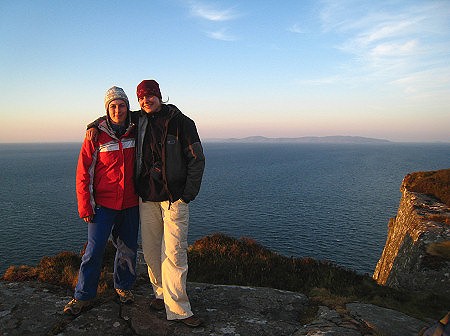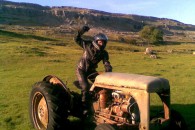

My first VS was my 29th lead, 8 months after my first – reasonably rapid progress. I then climbed no harder than VS for another two years, except for the odd attempt at something harder on a good day. I always wanted to climb harder and I thought that the improvement to HVS would happen eventually, but things kept getting in the way – injuries, personal problems, house purchases. These were all valid reasons for not being able to get the mileage in, but as it turned out they weren't holding me back – it was my head. Someone once raised the question – how do you know when a bad patch has become a plateau? I'd been a bit blind to my situation before this - I'd grown used to the fact that the mental side of climbing always limited me more than physical side, but I didn't think this was stopping me from improving, as I figured that head games were an integral part of climbing and I always attempted to deal with each issue as it arose. Slowly the truth sunk in – that my mental issues had caused me to hit a wall. Earlier this month though I had a bit of an epiphany, all the training and research I've ever done on the mental side of climbing came together, and things suddenly make a whole lot more sense. I've had a wonderful run of form for 3 weeks, within that I on-sighted 5 HVS's in 7 days and they felt far easier than any I did last year even though I'm not much fitter or stronger, and on the spring bank holiday Monday I went to Fairhead and on-sighted my first E1. I'd like to share what happened with others, in case there's anyone stuck on a plateau or struggling with head games as I was. I hope it's inspirational on some level rather than sounding self indulgent or hippyish, but if not it'll just be a reminder of the time things turned around for me. You may read it and go 'so what?' or 'I've always done that', but I hope in that case you can work out how and share the knowledge with others like me who have struggled.
Towards the end of 2007, I read the book The Rock Warrior's Way by Arno Ilgner, with its catchphrase 'mental training for climbers'. This isn't meant to be an advert, but the book speaks sense. Arno makes several compelling points, the crucial ones for me being:
- It's important to embrace the challenge of climbing instead of avoiding it.
- You should constantly work to expand your comfort zone rather than working within it, so situations are easier to deal with the second time round.
- Your ego will try to keep you in a emotionally safe place using lies (an ego is more than just cockiness and arrogance, it's any self indulgent feelings, even negative ones such as 'I'm not good enough to do this').
These match up with my main mental issues, which both fit under the sub heading 'motivation at the crag':
- Lack of 'mental stamina'. i.e. After every lead I wasn't able to handle the stress, so wouldn't want to do another.
- Getting psyched out by routes – either hard routes, routes off my wish list, popular routes... any route really!

It's a wonderful feeling, when you suddenly embrace the challenge instead of shying away from it. It's like having your first climbing experience all over again, every time you go out - going to a crag, seeing your route, thinking it looks scary but being able to say 'f*ck yeah, bring it on' instead of leaving it for another day. The ego will speak up with little 'buts', but that voice is easily quashed once you're expecting it.
I still wake up with the same thoughts, the little 'buts', it just leads somewhere different, I managed to turn each one around. 'Because it looks scary' is no longer a reason not to do a route, it's a reason TO do it. Because that's the challenge, dealing with the fear, that's what's good. Every thought I manage to turn from something negative into something positive gives me more joy and excitement about the day ahead, which then helps me to turn further thoughts around – a vicious upwards-circle.

Climbing is now much more fun for me. Up until now, I wouldn't experience the 'fun' factor until in the pub afterwards, or at work the next day when I'd feel massively psyched and would have forgotten how I'd talk myself out of the experience every time I was at the crag. Now I get it when I'm ON the routes! This is pretty novel for me. I was on a route in the Lake District, two weeks ago, at the top of my grade, in a style that doesn't tend to my strengths. Towards the top I shouted down to my belayer “I'm just going to pause here a bit and shake out, and get ready for the next bit” – an automatic reaction and as soon as I said it I realised that wasn't what I was really thinking. Immediately afterwards I shouted down, “no I'm not, I'm going to go for it as I'm really excited!”, the surprise audible in my voice, as not only was I excited by the climbing, but by what I was saying and what it meant.
Everything feels so much more 'real' now there's no more excuses. This has hidden benefits too – I can listen to my actual sincere feelings, not made up ones. So I know when I'm actually tired, instead of just thinking I'm tired in order to make excuses to myself – this is great for avoiding injury as I know when to stop. Similarly, if I'm on a trip away and don't feel like climbing I can just go and do something else, like eat ice creams or paddle in the sea, without beating myself up that I've psyched myself out of routes yet again. Another side effect - There's no need to say “that was great, but I couldn't have led it” after seconding a route, now it's 'why on earth not, try it and see'! Finally it means I can talk about it frankly like this, as I know it's not luck that's caused my run of form, so I don't feel like I'm tempting fate to end it if I shout out about it.
















Comments